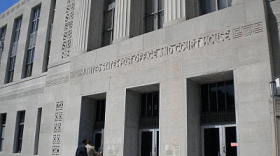Two federal judges said Thursday they are concerned that North Carolina legislative leaders have taken few if any steps to draw new election maps since they were struck down last year, and one judge suggested they don't appear to be taking their duty seriously.
A three-judge panel is deciding when and how the electoral map must be remade.
"What concerns, at least me, is the seriousness of how this is being taken by the legislature. This is serious," Judge James A. Wynn of the 4th Circuit Court of Appeals told a lawyer for the legislative leaders at a hearing in federal court in Greensboro.
His fellow panel member, U.S District Judge Catherine Eagles, then added: "You don't seem serious. What's our assurance that you are serious about remedying this?"
The panel ruled in August 2016 that 28 state House and Senate districts were illegally drawn, based on racial considerations. After Republicans took the case to the U.S. Supreme Court, the justices agreed this summer that the districts must be redrawn. Democrats hope the new boundaries could help them erode the GOP's veto-proof majorities in both legislative chambers.
Responding to the three judges' concerns, a lawyer hired by state legislative leaders said the General Assembly has shown its commitment to redrawing the maps by holding a redistricting committee meeting this week and preparing to take input from the public.
"We've outlined a process to do what's right for the people," attorney Phillip Strach said.
The legislative leaders have argued that they need until November to draw new maps for use in the next regular election in the fall of 2018. Plaintiffs including voters and civil rights groups, however, say the maps must be redrawn immediately and that a special election should be held before the legislature convenes its next regular work session in May 2018.
The voting rights activists have successfully argued that the current maps packed too many black voters into some districts and made surrounding districts whiter and thus more likely to elect Republicans.
The plaintiffs' lawyers say the maps should be redrawn as soon as possible to remove uncertainty for candidates, voters and donors who would normally already be preparing for the next election. They said the court can decide separately whether a special election is warranted, but they presented a proposed schedule that would include a general election in March 2018, weeks before the legislative session.
Attorney Anita Earls of the Southern Coalition for Social Justice said the argument boils down to weighing the value of extensive public comment sought by Republicans against "people knowing as soon as possible the value of their civic engagement."
Lawyers for GOP legislative leaders also say the U.S. Supreme Court has strongly signaled that special elections aren't warranted. The three-judge panel had previously told the state to hold special legislative elections in 2017, but the Supreme Court rejected that timetable. However, when the high court returned the case to the three judges it left the door open for them to again order a special election.
Democrats need to capture three House seats or six Senate seats currently held by Republicans to eliminate the GOP's veto-proof majorities and give first-term Democratic Gov. Roy Cooper a stronger hand.
Legal filings by the legislative leaders have said boundaries of about two-thirds of all 170 House and Senate districts are likely to be altered to fix the 28 that were struck down.
The judges said they would issue a ruling later.









